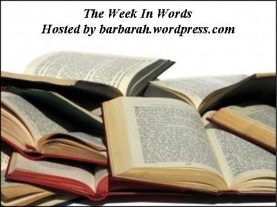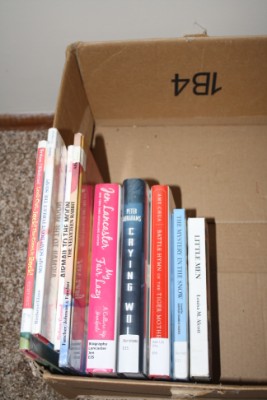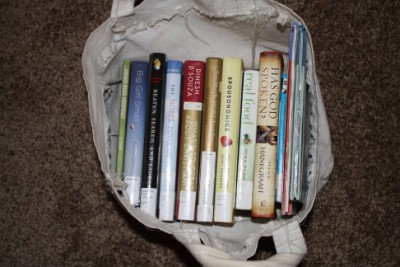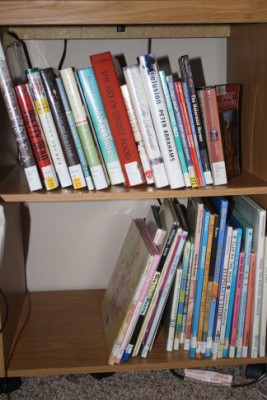Sherry’s review had me quickly placing a hold at my no-longer-local library, to be picked up the next time I was in town. Barbara’s review, read after the book was already in my possession but not yet read, had me itching to find out whose view I would take.
Amy Inspired, by Bethany Pierce, turned out to be everything Sherry had said it was–and everything Barbara described.
Amy is almost thirty, a single adjunct writing instructor who dreams of being a published author. Unfortunately, she is plagued with rejection letters and is in a perpetual state of writer’s block.
She gives an exhausted agreement to her roommate’s proposal to let an out-of-work friend crash at their place while his apartment is being fumigated for bedbugs–and ends up flabbergasted to discover that she’s just obtained a second roommate, a seemingly permanent fixture on the living room futon.
Eli is the typical starving artist, a brooding sort who ekes out a living as a coffee-bar barista while women swoon over his every step. Amy is not immune to his charms, but rather wishes she was, considering that he’s her roommate–and that he has a girlfriend (albeit a girlfriend who’s studying abroad and therefore not around).
As Sherry wrote, Amy Inspired has a very true-to-life ring to it. I couldn’t help but nod my head in recognition as Amy reads yet another freshman essay that makes absolutely no sense:
“Since the dawn of time there have always been forms of entertainments. And like most everything else, entertainment has been criticized since there existed a Being knowledgeable enough to know how to do it. In ancient times, Jesus was criticized by many of the people and even went so far as to crucify him by nailing him to a tree in front of all his fans.”
Yep, that’s freshman (or even sophomore) writing. (Three semesters teaching at the university level is more than enough to make a cynic of this particular lover of the written word.)
I felt as though Amy (er, Bethany Pierce writing as Amy) were writing my own heart when she described her thoughts after watching a marathon of “A Baby Story”:
“It made me want to scream and push, to be part of a miracle. It provoked cravings for the sweet powder smell of a baby’s hair. I told myself this was a biological phase on par with the hormonal revolution that made prepubescent boys ache at the sight of breasts and bucks chase doe tails right into oncoming semis. But still.
I’d tried praying about these feelings, but had a bad habit of praying tangentially…. All the years I’d wanted a husband, I prayed God would make me content as a celibate, confident that if He saw my willingness to remain forever His chaste servant, He would see fit to send me an unexpected blessing of a very handsome man….And now whenever the desire for a family of my own began to gnaw at my heart, I prayed for my students and thanked God for the brood He’d already given me.
Meanwhile, Valerie, who had never waited on God for a blessing in her life, was in the third trimester of her pregnancy and looked positively Rubenesque.”
When Amy goes to dinner with Eli, she orders beer to prove that she’s not the teetotaler he might think her because of her fundamentalist background. The exchange is essentially honest about the predicament that faces my generation of believers. Determined to not be legalists, we sometimes lose our identities trying to be all things to all men. So what if Amy doesn’t like beer? If she doesn’t order it, Eli might think she’s looking down on him, considering him an inferior Christian because he drinks. So she orders a beer, only to discover that the tattooed artist doesn’t drink.
For all that I can identify with in this book, there is certainly plenty that I can’t identify with. Amy’s Christianity is the Christianity I’ve seen in quite a few of my peers. She’s rejected her legalistic upbringing, but hasn’t quite figured out the spirit behind the law–which leaves her with a trembling hodge-podge of religious belief, but no cohesive theology out of which to live her life.
It is this, I think, that leads to some of the “edgy” scenes Barbara pointed out. Amy dates a nonbeliever, has a male roommate (for as long as Eli’s around), and reflects on past experience where she got down to bra and panties before putting a kibosh on sex. These are scenes I haven’t experienced (thank You, Lord!), but ones I’ve seen among the once-churched or quasi-churched of my acquaintance. Throwing off legalism, a young Christian culture has emerged that has little moral foundation except reactionism–resulting in dangerous skates to the edge of a precipice (and beyond).
And then there is Barbara’s objection to Amy’s “fundamentalist” background and its inherent stereotype. In truth, I couldn’t quite make out what the author presumes fundamentalism to entail. Apart from the brief comments about tracts in toilet paper rolls, True Love Waits campaigns, teetotaling, and not dancing, the majority of the references are simply to Amy’s childhood church “First Fundamentalist Church”–leaving the reader to fill in his own stereotypes.
In my opinion, this was the author’s great failing. Throughout the book, she does a fantastic job of showing rather than telling, of describing things so that the reader can experience them. Yet in reference to Amy’s childhood religion, she relies on the hackneyed “fundamentalist” stereotype in lieu of creating a flesh and blood congregation with real-live beliefs and practices. It’s rather disappointing.
Nevertheless, I felt that the upsides of this novel–its realistic depiction of life as a single young Christian and the author’s masterful use of language–definitely outweigh the downsides. This is a novel worth reading, both for enjoyment and as a means of understanding some of the struggles facing today’s single Christian (and the moral ambiguity facing many young believers who have uprooted themselves from legalism without being subsequently replanted in the fertile and stabilizing soil of the gospel of grace.)
Rating: 4 Stars
Category:Christian fiction
Synopsis: Amy, a single almost 30-year-old college-writing-instructor-slash-writer-who-hasn’t-been-published, finds herself thrown off-kilter by Eli, the artist who’s now sleeping on her living room futon.
Recommendation: Lovely writing, accurate depiction of many of the realities facing my generation of church kids, “edgier” (as Barbara put it) than most Christian fiction.







